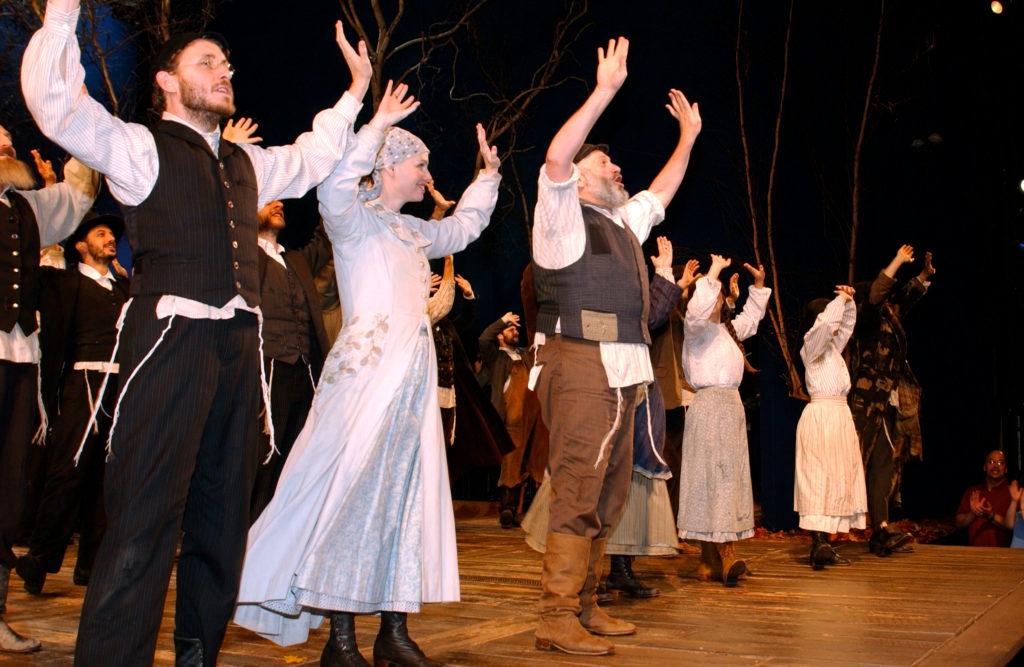Why ‘Fiddler on the Roof’ holds up 50 years later
Published September 23, 2014

The cast of “Fiddler on the Roof,” including actor Harvey Fierstein (C), takes their curtain call on at Minskoff Theater, Sept. 20, 2005 in New York. (Andrew H. Walker/Getty Images)
ADVERTISEMENT
Sunrise, sunset x 18,250 = this week marks the 50th anniversary of the Broadway premier of “Fiddler on the Roof.”
Here is the original JTA dispatch from Sept. 23, 1964:
NEW YORK (JTA) — Thousands of theater-goers stood in three lines for hours last night, seeking admission to the Imperial Theatre here, where a musical based on Sholom Aleichem’s Works “Tevya the Dairyman,” opened on the previous evening, evoking the most unprecedented praise ever voiced for a play on a Jewish theme produced on Broadway.
The winning musical, entitled “Fiddler on the Roof, ” stars the noted actor Zero Mostel as “Tevya,” and has a large cast which includes other well-known actors. It conveys very successfully and with abounding humor the life portrayed by Sholom Aleichem, the world-famous Jewish humorist, of the Jews in the small towns in Russia under the Czar. Mr. Mostel is extremely good in his role, and is ably supported by the cast. Critics predicted today that “Fiddler on the Roof” will be one of the most successful plays of the year on Broadway.
For the story behind the story, check out recent books by Barbara Isenberg (“Tradition! The Highly Improbable, Ultimately Triumphant Broadway-to-Hollywood Story of Fiddler on the Roof, the World’s Most Beloved Musical”) and Alisa Solomon (“Wonder of Wonders: A Cultural History of Fiddler on the Roof”
For those who find fault with the universalizing of “Fiddler,” the show is not wholly endearing, a fact that Isenberg readily acknowledges. Philip Roth dismissed “Fiddler” as “shtetl kitsch.” Cynthia Ozick described its book and lyrics as “emptied out, prettified romantic vulgarization.” More recently, according to Isenberg, the distinguished critic Ruth Franklin found one recent production of “Fiddler” to be “cartoonish, condescending and ‘pure Broadway.’”
My first response: Your point? Who doesn’t need a little shtetl kitsch once in a while?
That said, for all its sappy sentimentalism, “Fiddler” displays a deep and poignant courage, especially compared to other tradition-clashes-with-modernity fare produced in recent decades.
Films like “My Big Fat Greek Wedding” and “Bend it Like Beckham” essentially tell immigrant parents to relax — your kids can embrace Western culture and stay true to tradition.
“Fiddler,” on the other hand, has the fortitude to acknowledge that the weakening of tradition, while surely a boon for individualism, can have dire consequences. The musical does not flinch from hard truths: The rise of our modern world means the end of Anatevka. Tevye, his wife and their two youngest daughters are headed to the Golden Medina, but the coming waves of upheaval likely mean a bitter fate for the three daughters and their husbands who stay behind.
To quote myself (you can do that in a blog post, right?): The greatness of “Fiddler on the Roof” is not measured in Yiddish accents or shtick, but by its portrayal of change and tradition as a dangerous dialectic — experienced by a struggling milkman who never loses his sense of humor.
![]()















